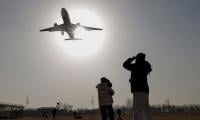Islamabad:Former Senator Mushahid Hussain Syed said Pakistan has always played a positive role in world affairs since its inception. During the anti-colonial movement, Pakistan gave its own passports to dignitaries from Algeria, Tunisia, and Morocco for their struggle and was their voice in liberation movements he said during his keynote speech on Pakistan’s role in global politics’ at a workshop ‘Training the Trainers’ which was organised by the Center for International Strategic Studies (CISS), here, says a press release.
He highlighted that despite challenges Pakistan can be a hub for regional connectivity. There are echoes of the emergence of what is called ‘Greater South Asia’ as a Geo-economic concept.
We are lucky to have China Pakistan Economic Corridor (CPEC) that will link Central Asia with the Indian Ocean through Pakistan. Pakistan has a strategic space for the first time in 42 years because, there is no war in Afghanistan. Moreover, Iran-Saudia rapprochement provides Pakistan with benefits; an antagonistic Bangladesh government has gone; and PM Modi is not that powerful anymore as he was in his previous term. Pakistan is hosting SCO and has also applied for the membership of BRICS. Pakistan’s problems are mainly man-made, thus, can be rectified because people of Pakistan have the spirit to take this country forward.
Former permanent representative of Pakistan to the United Nations, Dr. Maleeha Lodhi speaking to the inaugural session of the workshop identified seven key features of today’s strategic landscape while cautioning against calling it global world order as there is only global world disorder today: 1- Multipolarity witnessed in the economic shift from west to the other regions; 2- US-China confrontation and Washington’s China containment strategy; 3- East-west tensions, notably due to war in Ukraine; 4- Threats to multilateralism and rules-based order; 5- Rise of Populism; 6- Technological disruptions in a hyperconnected world and 7- the rise of middle powers determined to chart out their own foreign policy route without becoming part of an international alliance.
Addressing the workshop, CISS Executive Director Ambassador Ali Sarwar Naqvi said that Pakistan is a pivotal state located at the crossroads of South Asia, Central Asia and the Middle East which highlights its geopolitical importance. He said that India wants to build its status and revise the regional and global order. Indian-terror network operating across the world from Canada to Australia has also carried out terrorism in Pakistan. CISS Director of Research Dr. Aqeel Akhtar said that India – being an integral part of the US-led so-called Indo-Pacific axis – might be offered AUKUS-like cooperation in the future in the form of Japan-UK-US-India or India-France-US (INFRUS) alliance.
The three-day capacity building workshop was attended by faculty members from universities all across Pakistan including Quaid-i-Azam University, National Defence University, National University of Modern Languages, Air University, Bahria University, Fatima Jinnah Women University, International Islamic University, University of Karachi, University of Sargodha, University of Swabi, Punjab University, Abdul Wali Khan University, Bacha Khan University, Women University of Bagh, Islamia University Bahawalpur, University of Peshawar and Pakistan Navy War College.
Federal Minister for Education and Professional Training Dr Khalid Maqbool Siddiqui chairs a meeting on March 20,...
A representational image showing traffic police official interacting with a citizen. — PunjabTrafficPolice...
The picture shows students walking towards their school. — Online/FileIslamabad: Parents have complained about...
A delegation of prominent business leaders of twin cities of Islamabad and Rawalpindi led by Sardar Yasir Ilyas Khan ...
Ambassador Masood Khan addresses an event on June 15, 2024. — X@Masood__KhanIslamabad: Masood Khan, former President...
Rwandan Ambassador Fatou Harerimana in a meeting with Prime Minister's Coordinator for Climate Change Romina Khurshid...







